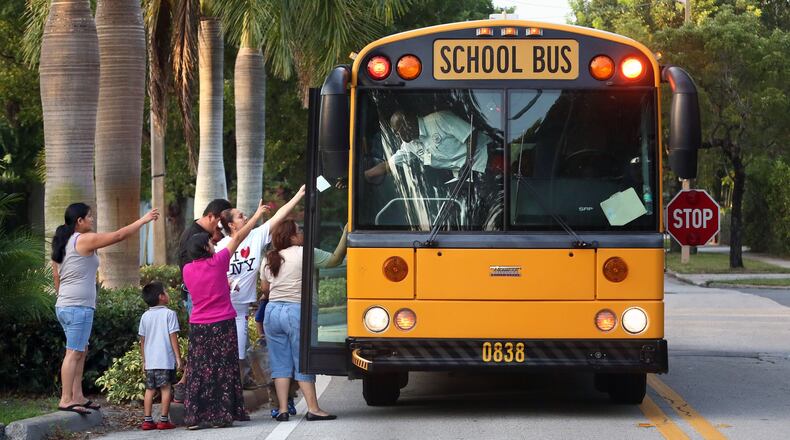A neighbor down the street recently told me she had an emergency and wouldn’t be able to walk her granddaughter home from school the next week. She asked me if I could do it. Understanding from my own experiences when I needed parenting help, I gave a reluctant yes. Her parting words to me after a quick pause, “Oh … and, what was your name?”
I was a part of her parenting village, and she didn’t even know my name.
Credit: Alyson Duke
Credit: Alyson Duke
The American Psychological Association has just released its latest data collection and summary on parental stress levels across the nation in their “Stress in America” report. Scores of elevated stress levels as compared to nonparents were revealed in many areas of life. U.S. After the report’s release, Surgeon General Vivek Murthy, America’s top doctor, made news by issuing an advisory to call attention to the matter of parental stress.
And what, might you ask, are most parents’ response to all of this recent, deeply mined data? Likely, as stated in the vernacular of the famed cultural anthropologist of the 1990s, Bart Simpson, it’s something like “Well, duh.”
Among the marked responses in the report were that parents were more likely than other adults without children under age 18 to report increases in certain stressors:
- Feeling consumed by worries regarding money (66% to 39%)
- Say no one understands how stressed out they are (62% to 42%)
- Stress makes it hard for them to focus: (60% to 37%)
- When they are stressed, they can’t bring themselves to do anything (50% to 28%)
Despite the research not being all that surprising, it is concerning. What’s to be done about this chronic problem plaguing our nation’s parents? How do we address and come alongside and offer support to this group that is so integral to the health of our nation?
Legislation on these areas is crucial and must be set as a priority in a country proclaiming it values families for a better tomorrow. But parents need help today.
Most parents don’t have a live-in nanny, au pair or a nearby grandparent to help out. Most parents, I suspect, are like me and my neighbor down the street — head down, doing the job tirelessly yet often feeling alone. Less like we’re isolated in a tower on a hill, but more like we’re isolated in a foxhole popping our heads up occasionally to see others lobbing out juice boxes and homework reminders.
In my time as a psychotherapist helping kids and parents finding paths to better healthier selves, offering parental fitness testing for the court system and diagnosing mental illness in children and adults, the health of children could often be boiled down to one concept: Apples don’t fall far from trees.
If we want our children to be healthier, happier, less anxious and depressed, then we as adults have to take a long look in the mirror. If parents are stressed out, kids see it, feel it and hear it, even if we don’t intend on them to.
Is it any wonder that so many children and teens are diagnosed with an anxiety disorder? It begs inquiry into the question, who’s affecting whom?
Parents in general are a self-sacrificial cohort by nature — from the single mom to the auntie to Bubbie raising her grandkids. We want the best for our children and are willing to go through hell or high water to achieve it. However, sacrificing our own mental health on the altar of our children’s happiness backfires every time. Our kids are watching, and whether we like it or not, they are learning our emotional cues and responses.
There are no hacks. No quick fixes, no five-step techniques that will stabilize our personal stress level or fix the social fabric of our parenting culture in 30 days or less. This is a pervasive issue that is deeply embedded into the way we live, work and raise our kids. The village is scattered and usually has to be fought for tooth and nail.
But it’s still worth fighting for.
When I set out over 15 years ago on my journey of parenthood, I did not expect that road to be so isolating, difficult and exhausting. On more than one occasion, I’ve cried with my head in my hands in the bathroom and bit my nails to the nub. “Mommy messed up; do you forgive me?” is not a rare phrase in my home.
We’re all facing similar hurdles; some of us have it harder than others. So many of you parents are weathering a lonely and stressful season right now. I hear you and you’re not alone. On more than one occasion, I’ve wondered if I have what it takes and I’m guessing you have too.
The answer? You do. I do. And more importantly, we do, together.
Start to build a life that you want, little by little. Do something that eases your stress level in a healthy way. Exercise, eat healthy, get good sleep, all the basics. Talk to a professional if needed.
And then, when you’re dropping your kid off at school, look across at the next parent over and tell them your name and start a conversation. Because goodness knows, we need each other and it helps to start with knowing each other’s names.
Beth Collums is an Atlanta-based writer. With a professional background in child and family therapy, she often writes about mental health, relationships and education.
About the Author
Keep Reading
The Latest
Featured



